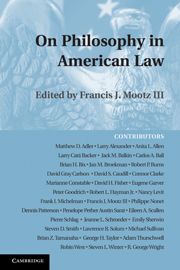Book contents
- Frontmatter
- Contents
- Introduction
- PART I KARL LLEWELLYN AND THE COURSE OF PHILOSOPHY IN AMERICAN LAW
- 1 On Philosophy in American Law (1934)
- 2 Law in Life, Life in Law: Llewellyn's Legal Realism Revisited
- 3 On Realism's Own “Hangover” of Natural Law Philosophy: Llewellyn Avec Dooyeweerd
- 4 On the Instrumental View of Law in American Legal Culture
- 5 When Things Went Terribly, Terribly Wrong
- 6 The Mechanics of Perfection: Philosophy, Theology, and the Foundations of American Law
- PART II PHILOSOPHICAL PERSPECTIVES ON LAW
- PART III AREAS OF PHILOSOPHY AND THEIR RELATIONSHIP TO LAW
- PART IV PHILOSOPHICAL EXAMINATIONS OF LEGAL ISSUES
- PART V LAW, RHETORIC, AND PRACTICE THEORY
- PART VI QUESTIONING THE RELATIONSHIP BETWEEN PHILOSOPHY AND AMERICAN LAW
- PART VII COMMENTARIES
- Contributors and Selected Bibliography
- Name Index
- References
6 - The Mechanics of Perfection: Philosophy, Theology, and the Foundations of American Law
Published online by Cambridge University Press: 31 July 2009
- Frontmatter
- Contents
- Introduction
- PART I KARL LLEWELLYN AND THE COURSE OF PHILOSOPHY IN AMERICAN LAW
- 1 On Philosophy in American Law (1934)
- 2 Law in Life, Life in Law: Llewellyn's Legal Realism Revisited
- 3 On Realism's Own “Hangover” of Natural Law Philosophy: Llewellyn Avec Dooyeweerd
- 4 On the Instrumental View of Law in American Legal Culture
- 5 When Things Went Terribly, Terribly Wrong
- 6 The Mechanics of Perfection: Philosophy, Theology, and the Foundations of American Law
- PART II PHILOSOPHICAL PERSPECTIVES ON LAW
- PART III AREAS OF PHILOSOPHY AND THEIR RELATIONSHIP TO LAW
- PART IV PHILOSOPHICAL EXAMINATIONS OF LEGAL ISSUES
- PART V LAW, RHETORIC, AND PRACTICE THEORY
- PART VI QUESTIONING THE RELATIONSHIP BETWEEN PHILOSOPHY AND AMERICAN LAW
- PART VII COMMENTARIES
- Contributors and Selected Bibliography
- Name Index
- References
Summary
American philosophy of law is better understood as theology than as that traditional American academic or pragmatic discourse that styles itself philosophy. The mechanics of an American philosophy of law provides a basis in reason for an American theology of faith in the perfectibility of law. The relationship among reason, faith, and truth (perfection) better defines an American philosophy of law than do traditional, merely rational, conceptions. This essay first examines the archetypal framework within which Americans work through their theology and construct their rational analytic frameworks for that purpose through the prism of two foundational cases, Swift v. Tyson (1842) and Erie Railroad Co. v. Tompkins (1938), and its transposition to American legal positivism. It then suggests that Benedict XVI's 2006 articulation of the foundational relationship between faith (theology) and reason (philosophy) is a better basis for understanding the American theology of law, the function of philosophy within that theology, and the role of the magisterium of judges in its elaboration.
Since the settlement of Plymouth Bay and the Virginia colonies, Americans have been obsessed with the mechanics of perfectibility. Perfectibility is built into the constitutive documents of the American republic. The preamble to the American Constitution declares the establishment of the American union: “in Order to form a more perfect Union, establish Justice, insure domestic Tranquility, provide for the common defence, promote the general Welfare, and secure the Blessings of Liberty to ourselves and our Posterity.”
- Type
- Chapter
- Information
- On Philosophy in American Law , pp. 44 - 52Publisher: Cambridge University PressPrint publication year: 2009



